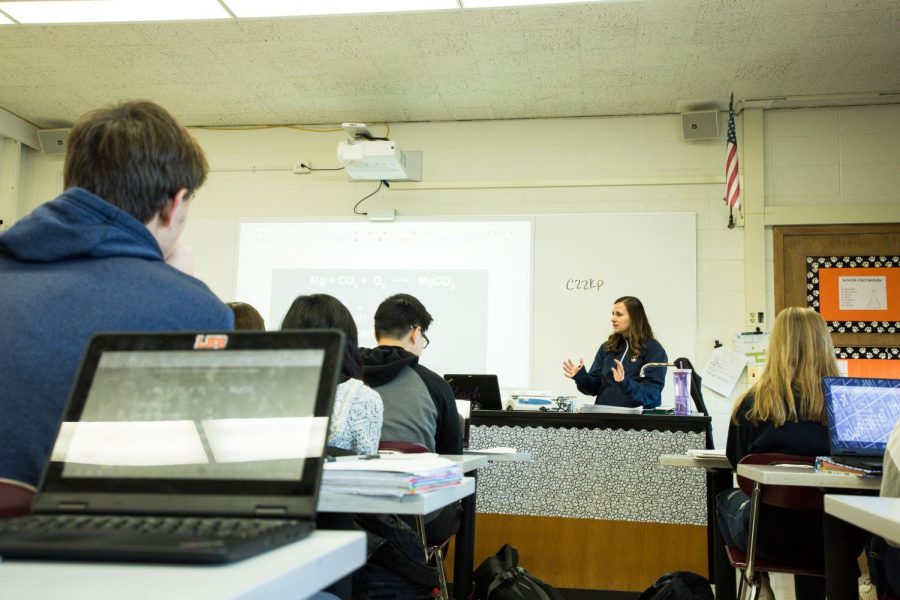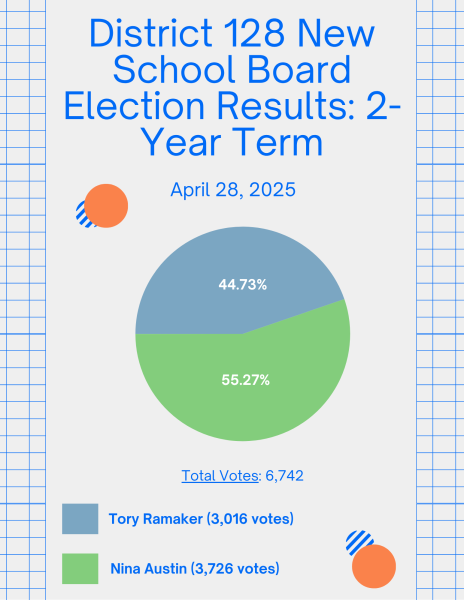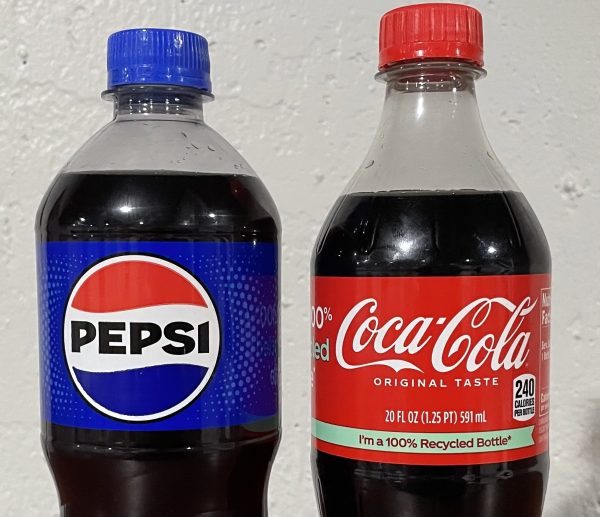New, blended courses on next year’s schedule
Mrs. Bachar, a science teacher, is the future teacher of the new Blended Chemistry course. Blended Chemistry is available to LHS studetns next year, where studetns can take a course very similar to regular Chemistry, but it will run on a more college-like schedule.
Curriculum changes for the 2018-2019 school year include the addition of blended courses meant to challenge students’ independence and time-management skills required for college.
Dr. Debra Kellum, supervisor of the Applied Technology, Business Education, Family and Consumer Sciences and Library Department, stated that blended courses are new classes designed to help students prepare for college-style learning: ”The AP-level classes have a designed curricular rigor that completely is identical to a college-level class. [Blended courses], however, are going to be like a college-level class [in their] administration.”
The schedule of blended courses will be nearly identical to the structure of most college classes. For example, instead of meeting in a classroom five days a week, students in a blended class may have class Monday and Tuesday, but independent research time Wednesday and a meeting for a group project Thursday, with work time Friday. On days when they’re not in the classroom, students will be in areas such as the Drop-in Lab, Library and M.A.S.H.
“[The loose structure] gives the students a sense of independence,” stated Mr. Ole Stevens, the Director of Student Services.
These new courses include Blended Chemistry, Blended Algebra II, Blended Personal Finance, Blended Consumer Management, Mobile Maker’s App Development and AP Research. They will be available for sign up starting in January through mid-February to next year’s juniors and seniors. Blended Chemistry and Blended Algebra II are open to sophomores only if they are recommended for them. Blended courses will allow students to get credit for two classes in one.
According to Dr. Kellum, “[Blended courses] will mirror a lot of the college experiences that our students will be having in their near future.” Science Department Supervisor Mr. Pete Dawson agreed, saying, “A student who would probably do well would be able to monitor their own progress and have a realistic idea of, ‘Am I good enough with this particular content, or could I use my time and work on something else?’”
Blended Personal Finance and Consumer Management are meant to fill the Consumer Education requirement for graduation. Dr. Kellum described the two as being very similar, although “personal finance is more of a business focus; family consumer science has the same requirements, but they cook once a week.”
Mr. Dawson described Blended Chemistry as similar to regular chemistry but with added benefits: “Students can get more support, more examples, more help individually if they need it, but if they feel like they’re strong on the concepts, they can go to a different area and work on some different content.”
The distinction between taking regular chemistry and Blended Chemistry would be in their scheduling. In terms of learning targets and expectations, the classes will be nearly identical, Mr. Dawson said.
Dr. Kellum also excitedly introduced the Mobile Maker’s App Development course: “You literally could sit in this class and learn how to create your own app, put it out on the market, and earn money.” She wants students to be aware of the class, especially those “good with computer skills, [who] know how to code [and] want to know how to make their own apps.”
AP Research is an add-on to AP Seminar, which was first offered this school year. Mr. Stevens described AP Research as “a vital companion to AP Seminar.” The class is automatically an English credit, but students can specialize by choosing to do a science research project, for which they could get science credit.
The administrative team brought blended courses to LHS after exploring the idea for the past four years. Multiple teachers visited Huntley High School and observed blended classes before proposing a trial at LHS, eventually convincing principal Dr. Tom Koulentes and assistant principal Mr. Ray Albin to add the courses to next year’s options.
Dr. Kellum recommended that students take a blended course because they are the “precursor classes to being a grown-up. They [teach] skills that every student should have before they go off to college or enter the workforce.”
These soon-to-come additions to the LHS curriculum are not the only changes to be made. Subjects such as Bible as Lit and Computer Arts are changing their names to better reflect their content. Bible as Lit will become Literature of World Religions, designed to study religious texts besides those of Christianity, such as those from Islam and Judaism. Computer Arts will be known as Digital Art and Design to broaden its reach to students by encompassing art and design skills rather than just computer use.
Other changes in next year´s curriculum include expanding the availability of certain courses. Marketing will be open to freshmen through juniors; both Personal Finance and Consumer Management will be open to grades 10-12; and AP English Literature and AP English Language will be for grades 11-12. AP Seminar was modified to have English credit.
- The rest of the new classes are American Studies, Advanced Weight Training and Conditioning, Advanced CrossFit, Guitar Ensemble, Developmental College English, AP Environmental Science and Preschool 2.





![Mr. Abullh Ali, manager/assistant, helps open Queen Yemeni Coffee in downtown Libertyville at 606 North Milwaukee Ave. With the help of employees such as manager and LHS senior Yousef Taha, they are able to bring the Yemeni and Ethiopian culture to Libertyville by using their Queen spices, cinnamon and cardamom in their drinks such as Adani Chai, which is inspired by Sheda, the Queen of Yemen and Ethiopia. “The history of our coffee [is] a long history and we believe that Yemen and Ethiopia started the coffee and we are bringing something unique to the community,” Mr. Ali said.](https://www.lhsdoi.com/wp-content/uploads/2025/04/Photo-1-600x400.jpg)


